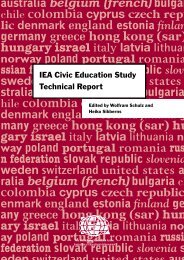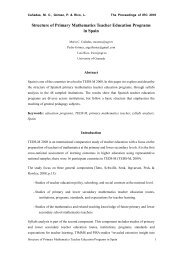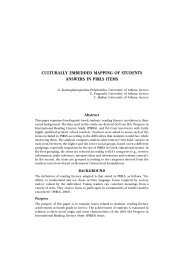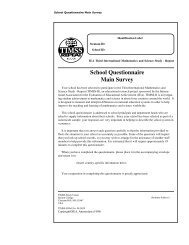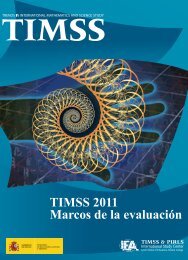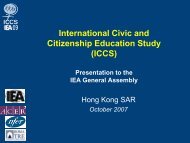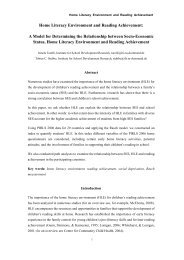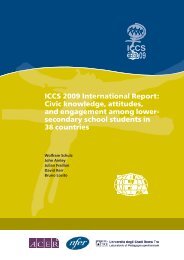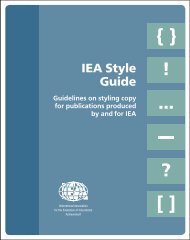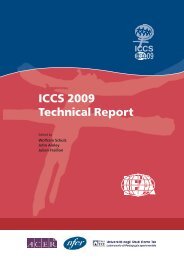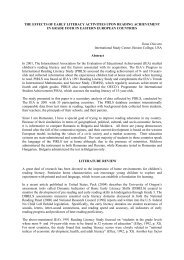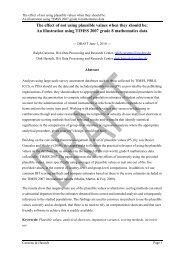International civic and citizenship education study - iccs - IEA
International civic and citizenship education study - iccs - IEA
International civic and citizenship education study - iccs - IEA
- TAGS
- civic
- citizenship
- iccs
- www.iea.nl
You also want an ePaper? Increase the reach of your titles
YUMPU automatically turns print PDFs into web optimized ePapers that Google loves.
The coverage of framework domains<br />
Table 4 shows the mapping of cognitive <strong>and</strong> affective-behavioral domains to content domains.<br />
It also shows, within each cell, coverage of the cognitive <strong>and</strong> perceptions items included in the<br />
international student test <strong>and</strong> questionnaire.<br />
Table 4: Coverage of cognitive/affective-behavioral <strong>and</strong> content domains in the ICCS student survey<br />
Cognitive domains<br />
ICCS ASSeSSment FrAmework<br />
Content domains<br />
Civic society Civic Civic Civic Total<br />
<strong>and</strong> systems principles participation identities<br />
Knowing 15 3 1 0 19<br />
Analyzing <strong>and</strong><br />
reasoning 17 22 17 5 61<br />
Total 32 25 18 5 80<br />
Affective-behavioral<br />
domains<br />
Value beliefs 12 12 0 0 24<br />
Attitudes 12 18 18 14 62<br />
Behavioral intentions 21 21<br />
Behaviors 14 14<br />
Total 24 30 53 14 121<br />
Note: The table does not include optional student questionnaire items.<br />
The cognitive items from both domains (knowing <strong>and</strong> reasoning <strong>and</strong> analyzing) <strong>and</strong> the affectivebehavioral<br />
items from two domains (value beliefs <strong>and</strong> attitudes) were developed within the<br />
contexts of all four content domains. However, the items are not spread evenly across the cells<br />
in the table: most items measuring the cognitive domain knowing relate to the content domain<br />
<strong>civic</strong> society <strong>and</strong> systems. The affective-behavioral items measuring value beliefs relate to two of<br />
the four content domains only (<strong>civic</strong> society <strong>and</strong> systems <strong>and</strong> <strong>civic</strong> principles).<br />
Item types<br />
The ICCS instruments include a range of different item types in order to assess a diversity of<br />
cognitive, affective-behavioral, or contextual aspects.<br />
The cognitive test contains two item types:<br />
• Multiple-choice (MC): Each item has four response options, one of which is the correct<br />
response <strong>and</strong> the other three of which are distracters.<br />
• Open-ended response (OR): Students are requested to write a short response to an open-ended<br />
question. The responses are scored by scorers working for the national centers.<br />
Six of the 80 ICCS test items are open-ended response items. All other items have a multiplechoice<br />
format. Test questions are typically organized in units within which the content of all<br />
items refers to a stimulus describing a particular situation or problem <strong>and</strong>, in a few cases, is<br />
accompanied by a graphic. Appendix B provides examples of ICCS test questions.<br />
47



